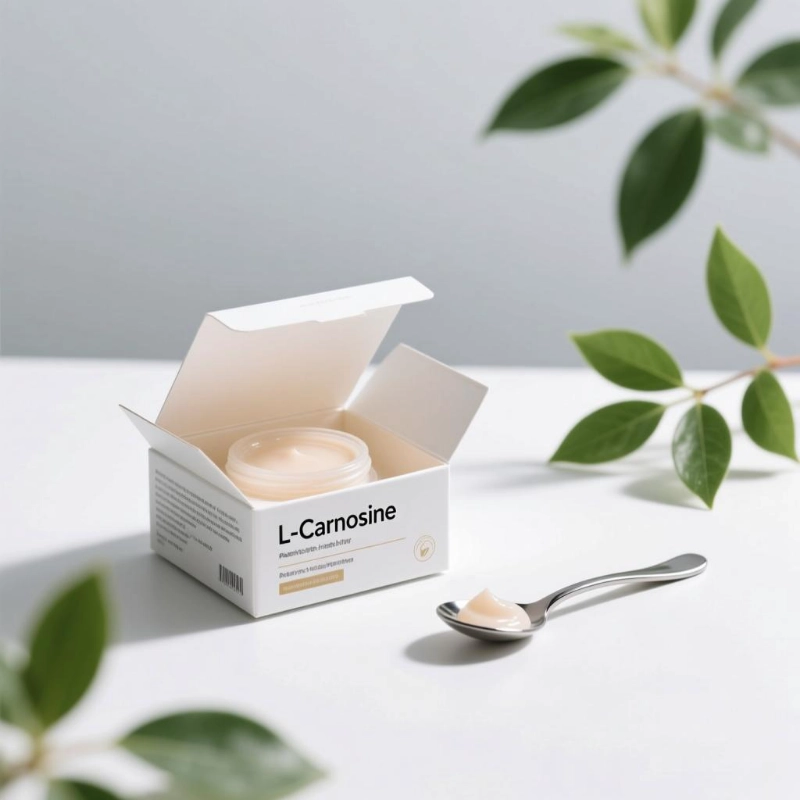L-carnosine (CAS No.: 305-84-0) is composed of beta-alanine and L-histidine. Found in high concentrations in tissues such as the brain, muscles, and skin, this molecule has gained attention for its remarkable physiological properties. In this blog post, Viablife, a high purity natural cosmetic ingredients manufacturing factory, shares the L-carnosine benefits for skin, among its many biological functions.
Role of L-Carnosine in Skin Physiology
Before diving into cosmetic applications, it is important to understand how L-carnosine works within the body. This crystalline solid acts as a potent antioxidant, stabilizing cellular membranes and reducing oxidative stress. By minimizing lipid peroxidation, it helps protect neurological and skin functions alike. In skin tissue specifically, it contributes to maintaining structural proteins like collagen and elastin, both of which are central to skin strength and elasticity.
Anti-Oxidation Pathways and Skin Protection
How Antioxidants Strengthen the Skin
One of the most significant L carnosine benefits for skin lies in its antioxidant capabilities. Free radicals, generated by UV radiation, pollution, and normal metabolism, are primary culprits behind premature skin aging. L-carnosine neutralizes these free radicals while inhibiting lipid oxidation, thereby preventing cell damage.
Defense Against Glycation
In addition to fighting oxidation, L-carnosine also inhibits glycation - a process where sugars bind to proteins, forming advanced glycation end-products (AGEs). AGEs disrupt collagen structure, making the skin stiffer and more prone to wrinkles. By minimizing AGE formation, L-carnosine preserves the suppleness and resilience of the skin.

L-Carnosine and Skin Elasticity
Preserving Collagen Integrity
The body' s natural levels of L-carnosine decline with age, leading to increased collagen cross-linking and visible aging signs. Supplementing with L-carnosine or applying it in topical formulations can help counteract this decline. Collagen fibers remain more flexible, allowing the skin to retain firmness and bounce.
Anti-Wrinkle Mechanisms
Wrinkles are often the most visible markers of skin aging. L-carnosine slows down cross-linking between collagen molecules, which reduces fine lines and promotes smoother skin. This is one reason why skincare researchers continue to highlight the skin rejuvenation benefits of L-carnosine.
Whitening and Photoprotection Properties
Tyrosinase Inhibition and Skin Tone Regulation
L-carnosine demonstrates an inhibitory effect on tyrosinase, the key enzyme responsible for melanin production. Excessive melanin synthesis often results in pigmentation issues such as age spots and uneven skin tone. By moderating tyrosinase activity, this dipeptide supports a clearer, brighter complexion.
Shielding Against Sun Damage
Ultraviolet (UV) radiation is a major factor in skin aging. Another layer of L carnosine skin benefits lies in its photoprotective ability. It minimizes UV-induced oxidative stress and helps protect fibroblasts, reducing long-term photoaging risks. When included in sunscreens and whitening products, L-carnosine offers dual action: enhanced protection and tone correction.
Energy Metabolism and Its Impact on Skin Health
Though often overlooked in cosmetic discussions, energy metabolism plays a key role in maintaining healthy skin. L-carnosine supports cellular energy pathways and protein synthesis. For skin cells, this means better resilience against environmental stress, improved repair mechanisms, and an overall healthier appearance. By strengthening the skin' s metabolic foundation, L-carnosine enhances both function and aesthetic outcomes.
Applications of L-Carnosine in Skincare Formulations
Functional Ingredient in Cosmetics
In cosmetic science, L carnosine benefits for skin translate into multiple formulation possibilities. From anti-aging serums to brightening creams, its role is versatile. As a natural antioxidant, it safeguards fibroblasts and protects against lipid oxidation, making it a staple in high-end formulations designed for long-term skin health.
Complementary Role in Pharmaceutical Preparations
Beyond cosmetics, L-carnosine' s properties are being researched for therapeutic skin applications. Its cell-protective and antioxidant features may aid in conditions related to oxidative stress, potentially expanding its role in dermatological pharmaceuticals.
Viablife' s Biosynthetic Innovation
Biotechnological advancements have transformed production methods. Viablife' s biosynthetic approach uses renewable carbon sources and precise strain screening to achieve high-purity L-carnosine with uniform particle size. For formulators, this ensures consistent quality and better integration into skincare products.
Conclusion
L-carnosine, a naturally occurring dipeptide, holds remarkable promise for skincare. From its antioxidant power and anti-glycation effects to its role in preserving collagen and protecting against UV damage, its contribution to skin health is both broad and profound. With biosynthetic production ensuring purity and consistency, this compound is set to become a cornerstone of next-generation skincare. For anyone seeking youthful, resilient, and radiant skin, the science strongly supports exploring products enriched with L-carnosine.





 Leave a Message
Leave a Message